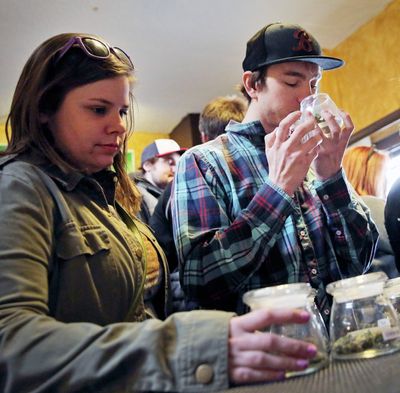
Ever since the New York Times came out of the cannabis closet Sunday and endorsed legalized marijuana for those of legal drinking age, DI has been wondering what real drug-policy changes we can expect on the federal front. Though Colorado’s Representative Jared Polis introduced the Ending Federal Marijuana Prohibition Act of 2013 in the 113th Congress, the legislation didn’t go anywhere and we’re really not holding our breath.
So we got to thinking — is there a way to bypass all that? Can the stroke of an admitted stoner’s pen change drug policy for potsterity?
It turns out, the answer is yes — simply by changing how pot is classified.
Cannabis is currently a Schedule 1 drug under the Controlled Substances Act, placing it among the most tightly controlled substances in the country. (Schedule 2 drugs have medical uses but are highly easy to abuse, while Schedule 3 ones are even less addictive and only “lead to moderate or low physical dependence or high psychological dependence.”) But determining what drugs fall into which category doesn’t only fall to Congress: federal agencies also have a say.
In January, Jacob Sullum called bullshit on Barack Obama’s insistence that his administration had no control over how cannabis is classified. In an interview with CNN’s Jake Tapper, Obama insisted that scheduling drugs is up to Congress, even when Tapper fired back that the power also lies with the Drug Enforcement Agency. Sullum explained:
As Tapper pointed out, that’s not true. While Congress can amend the Controlled Substances Act (CSA) to increase or reduce restrictions on particular drugs, the statute also gives that power to the attorney general, who has delegated it to the Drug Enforcement Administration (a division of the Justice Department). In fact, the DEA has repeatedly rejected petitions to reschedule marijuana, most recently in 2011. I forget: Who was president then?
Of course, Obama’s views may “evolve” as his second term winds down, or, quite possibly, the ever-spreading legalization of medical marijuana may push him to make a decision he was previously unprepared for. (How many states does it take to undermine a federal prohibition, after all?)
To find out what else Obama could do for marijuana reform, DI called up UCLA drug-policy expert Mark Kleiman. According to Kleiman, actual marijuana research is the next big battleground, and one where the president could easily have some influence. As regulations currently stand, marijuana is one of the most difficult drugs to study because there is only one approved source of pot for official, FDA-approved studies: the University of Mississippi. It’s easier to conduct research on heroin.
Not only is approval tough to get, but Kleiman says, “every fourteen-year-old boy has access to better pot than any research scientist.”
Since the lab is run by federal agencies, a call from Obama could allow other universities to grow pot for research, or could loosen up restrictions. (Kleiman points to the National Institute on Drug Abuse or the DEA as two possible avenues for that change.) Instead, the DEA blocked requests from UMass to create another cannabis research facility.
Apparently, pot research is an unpopular topic because medical marijuana proponents worry that fighting for more research will imply the drug is not already safe for consumption, while prohibitionists are wary of anything that would imply tolerance. As a result, studies that would write the case for — or against — legalization simply do not exist. “The stuff that Pillsbury knows about brownie mix is simply not in the literature,” Kleiman laments.
But at the same time, Kleiman says Obama has already taken a significant step for marijuana-reform advocates, by simply letting states chart their own courses. “The decision to say that they were not going to make a priority of large-scale commercial cannabis sellers in the states where that is now legal was a huge deal,” he says. Since the federal government’s laws make no room for legalized smoking, it could’ve eliminated the fledgling cannabis trade in Colorado and Washington “overnight.” So that was pretty cool of him anyway.





























